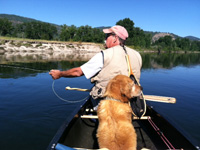The Surgeon’s Strike Against the Wilderness Act
by Jeff Smith 
An undercurrent of hostility toward wilderness boiled over in the U.S. House of Representatives when members passed H.R. 4089, the so-called
Sportsmen’s Heritage Act, on April 17. The vote was a slam-dunk, 274 to 176, with 39 Democrats joining 235 Republicans to support a bill that green groups, big and small, agree will eviscerate the Wilderness Act.
My colleagues George Nickas and Kevin Proescholdt have written a thorough
analysis on how H.R. 4089 would effectively repeal the Wilderness Act. Others have written about how the law undermines other public lands protections.
Now the fight moves to the Senate, where the bill arises as S. 2066 sponsored by Lisa Murkowski of Alaska and a Farm Bill amendment by Jim Risch of Idaho. It’s important to contact your Senators to oppose both bills. Most effective is an email or a letter in your own words. Here is our
alert with background information. Please also sign Wilderness Watch’s
petition, which is well on its way to 10,000 signatures.
What’s going on here is sad and astonishing. We’re seeing the end of a 50-year consensus that brought into being our environmental infrastructure, the laws, agencies, and regulations that have kept the air and water clean, moved the national forests away from unsustainable harvests, given citizens a voice in natural resources decisions, and created the ultimate benchmark, a Wilderness system loaded with 110 million acres of unparalleled landscapes we hope to leave as a legacy to our progeny.
H.R. 4089 demonstrates how vulnerable Wilderness has become to the whims of the radical fringe within the Beltway increasingly willing to sabotage Wilderness by burying revisionist language in otherwise unrelated legislation.
Let’s take a closer look at how Wilderness Act repeal language found its way into a bill supposedly concerned with hunting and fishing issues.
The chairman of the House Natural Resources Committee, Doc Hastings, a Pasco, Washington Republican, stitched together H.R. 4089 from a handful of separate bills sponsored by grandstanding GOP congressmen and a congresswoman reacting against the possibility that federal agencies or the President might do things they objected to:
- Following the outcry of the National Rifle Association, Arizona’s Jeff Flake objected to the idea that the Bureau of Land Management (BLM) might shut down recreational shooting in several national monuments in Arizona, a controversy simmering for the last decade. Shooters were killing trees and saguaro cacti, leaving piles of trash, and scaring ranchers whose cattle graze the landscapes. Three BLM officers weren’t able to control the damage and debris in half a million acres of desert. In any event, Congressman Flake’s solution – added to H.R. 4089 – was to require congressional approval for all existing and future shooting restrictions on BLM-managed national monument lands.
- Florida’s Jeff Miller sponsored a bill he called the Hunting, Fishing and Recreational Shooting Protection Act, objecting to the possibility that the Environmental Protection Agency (EPA) might use the Toxic Substances Control Act to regulate lead in ammunition and fishing tackle. The EPA had twice rejected petitions from conservation and hunting groups to ban lead bullets, shotgun pellets, and fishing tackle. These groups had brought forth data saying lead poisoning was killing millions of birds and animals each year and that hunters who eat wild game show higher lead levels in their bloodstreams. EPA rejected the idea and told petitioners, twice, that this was beyond the agency’s authority. No matter. Miller’s bill became part of H.R. 4089.
- Alaska’s Don Young wanted an exception to the Endangered Species Act so that 41 American hunters could bring into the U.S. polar bears they had killed in Canada. The dead “trophies” were being held in cold storage in Canada, complicated by the recent addition of polar bears on the endangered species list. Young played up the fact that several of the hunters were wounded Iraq War vets. His provisions became part of H.R. 4089.
- North Carolina’s Virginia Foxx offered the Preserve Land Freedom for Americans Act to severely limit the President’s ability to set aside historic or culturally important federal lands as national monuments using the 1906 Antiquities Act. Though previous Presidents had used this law 129 times to preserve important landscapes, Foxx didn’t want our current president to be able to do so without each state’s governor and legislature also approving the declaration before the President’s actions would become law. This, too, became part of H.R. 4089.
- A freshman Member of Congress and retired surgeon from Iron River, Michigan, Dan Benishek wanted to block environmental groups from someday convincing federal agencies to restrict hunting, fishing, and recreational shooting on public lands. His legislation would guarantee “that opportunities are facilitated to engage in fishing and hunting on federal public lands.” In the hearing, Congressman Raul Grijalva pointed out that four of every five acres of federal land are currently available, with more than 95 percent of both BLM and national forest lands – a total of 438 million acres – open for hunting and fishing, but that wasn’t enough. Benishek thought the redundancy was necessary.
Benishek’s bill also contained surgical strikes against the Wilderness Act. Indeed, all the banter about hunting and fishing access was really a Trojan Horse obscuring the real intent behind the law―a thinly veiled attempt to gut the Wilderness Act pushed strongly by the NRA and Safari Club. Hastings adopted the language unchanged into H.R. 4089, and, without much fanfare, the bill passed the House.
With few exceptions, the Wilderness Act prohibits the use of motor vehicles, aircraft, motorboats, other mechanized transport, motorized equipment, and the building of temporary roads, structures or installations. Benishek’s language in H.R. 4089 does away with these restrictions if a person is hunting, fishing, or recreational shooting. In other words, if you’re carrying a gun or fishing rod under Banishek’s provisions, you can drive your ATV or other motorized vehicle into any designated Wilderness. Similarly, an endless array of manipulations and trammeling would be allowed by the House bill: construction of roads, dams, hunting cabins, and much more would be allowed if they could be justified as aiding recreational hunting, fishing, or shooting.
H.R. 4089 hijacks the Wilderness Act’s prime directive. Federal agencies are supposed to measure their decisions by whether they contribute to maintaining the wilderness character of the areas they manage. Banishek’s language would shift wilderness managers’ focus to promoting easier access for hunting, fishing and shooting recreation and to managing wilderness as game farms, where managers could employ virtually any measure to modify natural conditions in order to increase game numbers.
“These [Banishek] provisions strike at the heart of the Wilderness Act and its foundational underpinnings to preserve an untrammeled Wilderness,” Nickas and Proescholdt write in
Wilderness Watch’s analysis. The bill “would allow any sort of wildlife habitat manipulation that managers desire to do . . . logging, chaining, roller-chopping, or bulldozing forests and other vegetation to create more forage for deer, elk, or other game species.”
The Congressional Research Service points out that H.R. 4089 would also bar the application of NEPA, meaning an agency could cite H.R. 4089 to weaken wilderness protections and not do the environmental analysis required by NEPA. Citizens’ comments would no longer be welcome if the Senate passes this bill unchanged and the President signs it.
Early in the floor debate, Congressman Hastings stressed that the bill was nothing to worry about, just “an affirmative declaration that Americans’ ability to fish and hunt is not arbitrarily subject to limitations by the whim of federal bureaucrats.” But, by the end of the debate it was clear Congressman Hastings understood precisely the ramifications of Banishek’s wilderness language.
We know this because New Mexico Congressman Martin Heinrich offered an amendment that would have made clear that nothing in H.R. 4089 could be construed “to allow oil and gas development, mining, logging or motorized activity on Federal public land designated or managed as wilderness.” Hastings led the fight to not only defeat the amendment but to insert his own amendment saying the bill’s provisions “are not intended to authorize or facilitate” these destructive uses.
That’s the amnesia defense, like saying you didn’t intentionally rob a bank after you just walked out with all the money. In other words, Hastings understood and approved this stealth attack to eviscerate the Wilderness Act, and Wilderness Watch will do everything we can to stop the bill from becoming law.
Link to George and Kevin’s analysis:
www.wildernesswatch.org/pdf/HR%204089%20Analysis--WW.pdf Link to Wilderness Watch alert and more information:
www.wildernesswatch.org/issues/index.html#Repeal Link to Wilderness Watch petition:
www.change.org/petitions/united-states-senate-block-passage-of-the-sportsmen-s-heritage-act-of-2012 Link to Wilderness Watch website:
www.wildernesswatch.org  Jeff Smith is Wilderness Watch's membership and development director.
Jeff Smith is Wilderness Watch's membership and development director.
 Conservation groups recently learned that the Forest Supervisor of the Willamette National Forest has withdrawn the draft decision on a proposal to conduct a “prescribed fire” in a portion the Mount Washington Wilderness. Three conservation organizations--Wilderness Watch, Blue Mountains Biodiversity Project and BARK—filed a formal administrative objection to the Scott Mountain Prescribed fire in Wilderness Environmental Assessment. The Forest Supervisor’s decision ended the objection process. While no reasons were given as to why the draft decision was withdrawn, points raised by the organizations certainly played a role in that decision. For the time being, the Forest Service will not subject this portion of the Mount Washington Wilderness to intensive ecological manipulation. Wilderness, by law, is to be untrammeled, which means that areas designated as Wilderness are to free from direct human control. In addition to the manipulation, the Wilderness would have been marred by numerous helicopter flights to light fires in the Wilderness.
Conservation groups recently learned that the Forest Supervisor of the Willamette National Forest has withdrawn the draft decision on a proposal to conduct a “prescribed fire” in a portion the Mount Washington Wilderness. Three conservation organizations--Wilderness Watch, Blue Mountains Biodiversity Project and BARK—filed a formal administrative objection to the Scott Mountain Prescribed fire in Wilderness Environmental Assessment. The Forest Supervisor’s decision ended the objection process. While no reasons were given as to why the draft decision was withdrawn, points raised by the organizations certainly played a role in that decision. For the time being, the Forest Service will not subject this portion of the Mount Washington Wilderness to intensive ecological manipulation. Wilderness, by law, is to be untrammeled, which means that areas designated as Wilderness are to free from direct human control. In addition to the manipulation, the Wilderness would have been marred by numerous helicopter flights to light fires in the Wilderness.

 An undercurrent of hostility toward wilderness boiled over in the U.S. House of Representatives when members passed H.R. 4089, the so-called
An undercurrent of hostility toward wilderness boiled over in the U.S. House of Representatives when members passed H.R. 4089, the so-called Jeff Smith is Wilderness Watch's membership and development director.
Jeff Smith is Wilderness Watch's membership and development director.